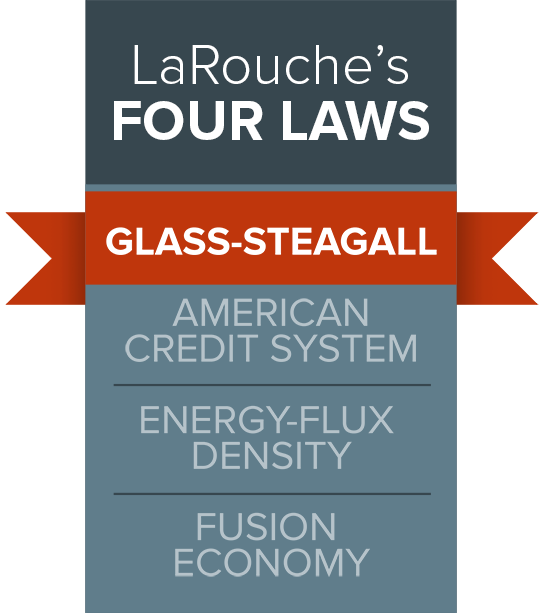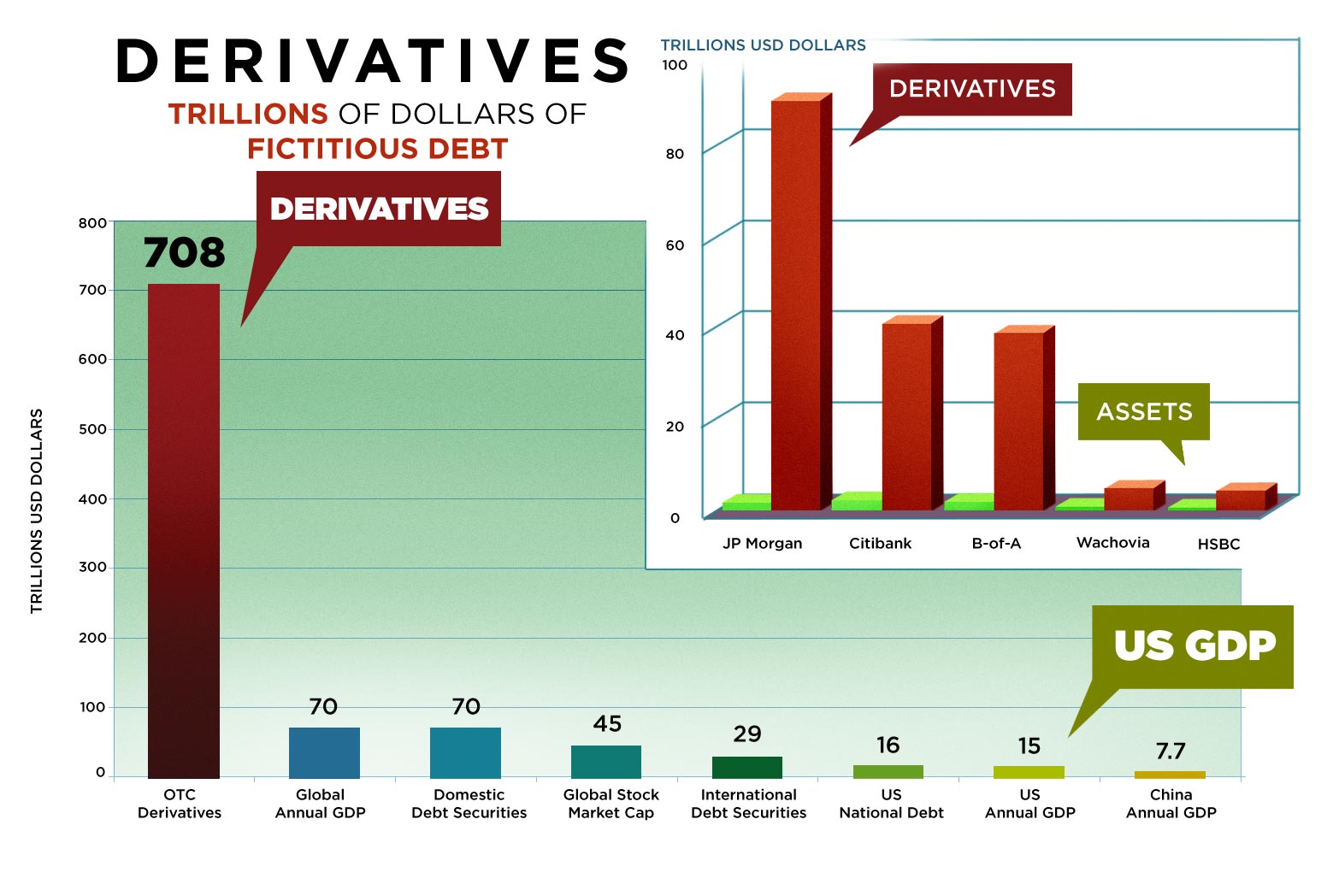Big Banks Need Glass-Steagall
INTRODUCTION
The 1999 repeal of the original “Glass-Steagall Act” of 1933 was perhaps the single greatest criminal act committed against the economic welfare of the American people in the 20th Century. Despite all claims to the contrary, the repeal of Glass-Steagall laid the groundwork for the creation of a monstrous derivatives bubble which burst during the financial crisis of 2007-2008. Following that crash, the first act of Congress should have been to correct their folly by restoring Glass-Steagall, thus eliminating the massive bubble of gambling values and erecting a firewall between the uncontrolled speculation on Wall Street and the livelihood of the American people — precisely as Franklin Roosevelt did in 1933 when the Glass-Steagall Act was first enshrined into law. Instead, under the threats and intimidation of the largest financial institutions, Congress passed an unprecedented bailout of the Wall Street banks, on the backs of an already destitute American population. Over the subsequent eight years, our people have suffered the mounting effects of this fraud, to the point that our nation now faces another financial blowout of far-greater magnitude than even that of 2007-2008. The only means of avoiding such a fate is the immediate restoration of Glass-Steagall today as the necessary first step to a full FDR-style recovery program, as has been spelled out in detail by LaRouchePAC.
Glass-Steagall put properly, is not a federal regulation aimed at restraining the criminal temptations of an otherwise happy-go-lucky Wall Street. Glass-Steagall’s aim is to “throw the money changers out of the temple of our civilization”, once again, as President Franklin D. Roosevelt had the courage to do. It is not an adjustment within an otherwise operable system. Glass-Steagall is a revolution in national policy, a Declaration of Independence against an oppressive regime.
Glass-Steagall will not regulate Wall Street, but destroy it, and put it out of its misery, once and for all. America does not need Wall Street for its economy to grow any more than a tumor would be helpful to the growth of a man. The American Credit System, long advocated by Lyndon LaRouche, is the historical beacon with which finance the nation’s future. The cult of Wall Street—the system of finance characterized by increased rates of gambling, stealing, and fraud, has, once again, nearly destroyed the United States and therefore itself. Like a cancer, it must kill you in order for it to stay alive.What’s At Stake?Just How Bad Is It?The Triple CurveTotal DerivativesHow Did It Get This Bad?Takedown of Glass-SteagallNomi Prins on Glass-Steagall“Nobody Could Have Known”LaRouche on the Record 2008“But, Give Dodd-Frank a Chance!”The Fight For Glass-Steagall TodayContact your member of CongressNational and International SupportS.881H.R. 790





Estimates are that the current magnitude of outstanding derivatives claims accumulated as a product of speculative financial practices (read: gambling debts), now measures in the hundreds of trillions of dollars, perhaps reaching even to quadrillions. Even when compared to the current nominal global GDP, estimated at around $70 trillion, it becomes immediately apparent that this debt can never be paid. The vast majority of these outstanding claims are of a purely speculative character, with absolutely no connection to legitimate, necessary, productive economic activity. To continue to bail out this vast bubble of gambling obligations on the back of a collapsed and rapidly shrinking real economy, would be to create, rapidly, Weimar-style hyperinflation on a global scale, and an economic crisis of Dark Age proportions.

“The Triple Curve” was first presented by Mr. LaRouche at a conference at the Vatican in 1995. The version seen above is the third in a series, and functions as a heuristic device to describe the generalized collapse function of the world economy since 1971. The only way to stem the further collapse of the system is by using a Glass-Steagall standard to reorganize the transatlantic economy such that the monetary and financial aggregates of the economy conform to an increase in the physical economic input-output of the system, versus a decrease.

Glass-Steagall halts this catastrophe. By restoring the separation between commercial and investment banking, Glass-Steagall divides the obligations in question into two distinct and separate categories: legitimate and illegitimate, the latter being far greater than the former. Immediately, we declare that the government has no responsibility to pay back losses accrued through speculative activity, thus transferring these trillions in liabilities off of the government’s books. We force the megabanks—JP Morgan Chase, Citigroup, Morgan Stanley, etc.—to split themselves in two parts: the so-called “investment arms” on the one side, and plain, old-fashioned commercial banking on the other.
Under the original Glass-Steagall law, only commercial banks receive federal guarantees; “investment houses” do not enjoy such protection. Though their trillions in outstanding “assets” might not be explicitly cancelled or eliminated by law, we will simply declare that these debts are their own, their responsibility, and not the American people’s. Not one penny of bailout goes to pay them off, and, without this artificial protection, these assets will quickly dry up on their own. We as a nation are freed from this cancer, and our commercial banking system is restored to its necessary and indispensable function. This was the stated intention of Franklin Roosevelt’s original 1933 Glass-Steagall Act.
Big Banks Call for Wall Street Deregulation to “Fight Coronavirus”
As Naomi Klein laid out in her bestseller “Shock Doctrine,” the wealthy elite use the confusion caused by economic and other disasters to quickly force through pro-free-market legislation.
by Alan Macleod
March 06th, 2020
As coronavirus panic hits the U.S., a financial lobbying group is attempting to use the crisis to push through the deregulation of its industry. The Bank Policy Institute (BPI), a Washington-based lobbying organization representing many of the nation’s largest banks, released a set of proposals this week, the most important of which recommends that the Federal Reserve lower capital requirements to zero. This would mean banks could lend an unlimited amount without having any assets or wealth to back it up. It also advocated relaxing the so-called “stress tests” that force banks to show that they can withstand economic shocks. This, it claims, would help America fight the COVID-19 virus. The report’s lead author was BPI CEO Greg Baer, former Managing Director of JP Morgan Chase.
The recommendations have been condemned as incoherent and “transparently opportunistic” by Jeremy Krass of the University of Michigan School of Business. “The whole idea of capital requirements and stress-testing banks is to make sure they have enough cushion to absorb losses” in a period of economic crisis, Kress told the Washington Post. Now that the economy has gone into a sudden shock, Wall Street wants those regulations lifted.
The government itself is also trying to force through measures that it dubiously claims would help fight the coronavirus. Earlier this week President Trump called on Congress to enact a large tax cut and pushed Democrats to support it.
These efforts perfectly encapsulate the idea of the “Shock Doctrine” that author Naomi Klein laid out in her 2007 book of the same name. Klein argued that the wealthy elite use the confusion caused by economic and other disasters to quickly force through pro-free-market legislation that would otherwise meet with widespread and coordinated opposition. As she said, “the idea of exploiting crisis and disaster has been the modus operandi of [economist] Milton Friedman’s movement from the very beginning – this fundamentalist form of capitalism has always needed disasters to advance.”
“Some of the most infamous human rights violations of this era, which have tended to be viewed as sadistic acts carried out by antidemocratic regimes, were in fact either committed with the deliberate intent of terrorizing the public or actively harnessed to prepare the ground for the introduction of radical free-market ‘reforms,’” she explained.
Klein cites Hurricane Katrina – where the Bush administration rushed through privatization and charter school bills for New Orleans while residents were reeling from the devastation – as a perfect example. Going further back, Chilean dictator Augusto Pinochet used his coup against President Salvador Allende to turn Chile into a free-market, neoliberal experiment almost overnight, over the protestations of ordinary Chileans, whom he suppressed with overwhelming force.

There are many things to worry about with the corinavirus, but a plunging stock market is not one of them, unless you are one of the minority who owns a large amount of stock https://cepr.net/coronavirus-the-stock-market-and-the-economy/ …Coronavirus, the Stock Market, and the Economy – Center for Economic and Policy ResearchMany people have become very concerned about the economy because of the stock market’s plunge in the last two weeks. While the spread of the coronavirus gives us very good reason to worry about the…cepr.net375:30 AM – Mar 6, 2020Twitter Ads info and privacySee Dean Baker’s other Tweets
The stock market is in serious decline amid fears that the coronavirus will disrupt international supply chains; the Dow Jones index plummeted nearly 1,000 points yesterday. Yet, as the Center for Economic Policy Research’s Dean Baker has noted, the stock market is a very poor indicator of the economy’s current and future health. It is, however, a great gauge on how the top one percent are faring. Stocks also tend to surge after natural disasters (like the 2004 Indian Ocean tsunami) or when conservatives win elections (in December, British banks and weapons manufacturers’ share prices jumped after Boris Johnson beat Jeremy Corbyn). This is because corporations, ignoring the devastation, expect big orders to rebuild or to destroy.

Existential Comics@existentialcoms
News that will cause stocks to go up:
– a minimum wage increase is struck down
– employees are prevented from unionizing
– corporate taxes are reduced
– labor laws are relaxed
The stock market is not the economy, it’s an estimate of how much wealth can be extracted from workers.12.1K5:52 PM – Jan 11, 2020Twitter Ads info and privacy4,237 people are talking about this
Today the number of COVID-19 cases worldwide reached 100,000, with 3,461 recorded deaths. In response, the Himalayan nation of Bhutan closed its doors to tourists altogether, Starbucks announced it would no longer allow customers to use their own cups due to concern about contagion, and the world’s smallest country, the Vatican, recorded its first case of coronavirus. In the U.S., 259 people have been infected, and 14 have died.
While emergency funding to combat the virus will be passed today, the American response has not been swift. Workers have not been guaranteed full sick pay while quarantining, leading to a situation where many poorer citizens will have to choose between doing the right thing and going broke. A Miami resident returning from China was presented with a $3,500 bill after reporting his flu-like symptoms to medical staff, leading to fears that a lack of universal healthcare will help the virus spread. Analysts, however, appear more concerned about the health of stock prices than the health of the nation. CNBC’s Rick Santelli suggested infecting the entire population with COVID-19 so nobody would have an excuse to miss work, thus effectively sacrificing the country for the sake of the economy. While there are many economic steps the United States could take to help the situation, deregulating Wall Street might not be the most necessary.
Feature photo | A pedestrian wears a surgical mask on a busy street in mid-town Manhattan, as concerns grow around coronavirus, March 3, 2020, in New York. Bebeto Matthews | AP
Alan MacLeod is a Staff Writer for MintPress News. After completing his PhD in 2017 he published two books: Bad News From Venezuela: Twenty Years of Fake News and Misreporting and Propaganda in the Information Age: Still Manufacturing Consent. He has also contributed to Fairness and Accuracy in Reporting, The Guardian, Salon, The Grayzone, Jacobin Magazine, Common Dreams the American Herald Tribune and The Canary.

Republish our stories! MintPress News is licensed under a Creative Commons Attribution-NonCommercial-ShareAlike 3.0 International License. 12 Comments












